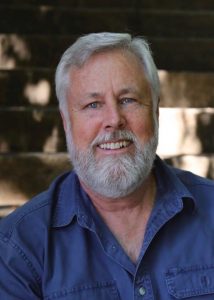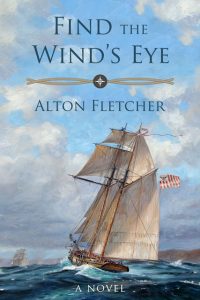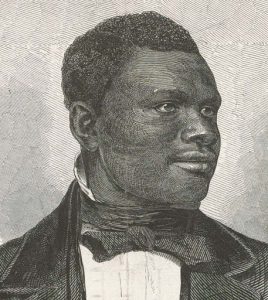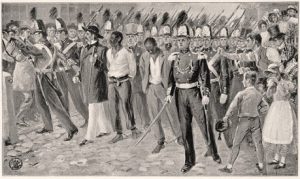I’m so excited to introduce my friend, Alton Fletcher, to Romancing History readers today. Alton writes historical fiction and his debut novel, Find the Wind’s Eye, released earlier this month. Another exciting first for Alton, he is the first male author I’ve had the pleasure of interviewing here on Romancing History!
Find the Wind’s Eye is a Antebellum tale with a message relevant for today’s reader about equality, the evils of prejudice and discrimination, and the condition of the human heart. I personally think Alton’s novel sounds intriguing and hope to read it next month so stay tuned for a review post when I’m done.
Alton has geneoursly offered 3 print copies of Find the Wind’s Eye to 3 separate Romancing History visitors so make sure you see the Giveaway section at the bottom of the post for details on how to enter the drawing.
Before we get to the interview, let’s learn a little more about Alton and Find the Wind’s Eye.
 About the Author
About the Author
Alton Fletcher enjoys sailing almost as much as he enjoys writing and sometimes wishes he could do both at once. He became enamored with the sea, sailing ships, and books upon his first reading of Robert Louis Stevenson’s Treasure Island as a boy. For the past twenty years, after retiring as an officer in the U.S. Coast Guard, he has made Virginia his home, where he continues to sail and write to his heart’s content.
Connect with Alton on his Website, Twitter, or his Amazon Author Page.
About the Book
 In 1854 Boston, Third Lieutenant Andrew Gunn of the United States Revenue Cutter Service questions the President’s direct order to extradite a fugitive slave, Anthony Burns, back to Virginia aboard his ship—a lawful order that he believes is immoral and unjust.
In 1854 Boston, Third Lieutenant Andrew Gunn of the United States Revenue Cutter Service questions the President’s direct order to extradite a fugitive slave, Anthony Burns, back to Virginia aboard his ship—a lawful order that he believes is immoral and unjust.
Torn between his own reverence for freedom as an American and his sworn duty, Gunn suffers the hazards of hard choices that threaten his own life, liberty, and happiness. His first real exposure to the scourge of slavery brings chaos to his ordered life, despite his desperate attempts to control it.
Set aboard a small ship in the midst of a gathering political storm, Find The Wind’s Eye is a timely, moving story about a man of principle trying to find his way in a fast-changing, increasingly ambivalent world. He strives to do the right thing, while struggling with the ugly truth of his own complicity in the national sin of slavery.
Find the Wind’s Eye is available for purchase on Amazon.
Author Q&A
Fast Five
- Dogs or Cats? Dogs
- Chocolate Chip or Oatmeal Raisin? Chocolate Chocolate Chip
- Night Owl or Early Bird? Night Owl
- I Love Lucy or Get Smart? I Love Lucy
- Oldies or Country? Country Oldies, Sea Shanties, and Old Hymns
RH: Hi Alton, welcome to Romancing History. Tell us a little bit about yourself. How long you’ve been writing? How many books you have published and what era you write about?
AF: Thank you for having me today. I look forward to meeting your readers. I graduated in 1977 from Geneva College, a Christian liberal arts college in Beaver Falls, Pennsylvania. My wife, Cheryl, and I were married in 1976, while still in college. We’ve been married ever since and have made our home in Manassas for the past 20 years. We honeymooned in Williamsburg, and we’ve always held a special place in our hearts for Virginia, so we were happy to finally settle here after the upheaval of seven cross-country military moves.
I had wanted to be a writer since high school, but after college, life happened. Work, kids (three daughters), more work, house payments, career, braces, college tuition, weddings, and so on. In addition to raising a family, I served for 22 years as a commissioned officer in the Coast Guard, retiring in 2003. Though gratifying and exciting, my days in the military were often long and exhausting, with extended periods of travel and temporary duty in remote places. Hard to find time to write. I retired a second time after a very busy, productive, and successful life in private industry in 2015. Actually, I drove home from work in heavy Washington Beltway traffic one day and decided I’d had enough. It was a now or never kind of thing. At age 60, I quit my day job and started writing fiction. And I haven’t stopped.
After more revisions than I can count, I’ve recently published my first historical novel, set in the 1850s. It’s a fascinating period of major transitions in technology, philosophy, religion, science, politics, and psychology that caused enormous social upheaval and personal turmoil. That turbulent period shaped the modern world as we know it today. We can’t really understand ourselves if we don’t know how we got here. That’s what I like to discover. What were people thinking back then? How did those huge changes affect them in their daily lives? How different were they from us? Have we really made progress since then? Though we are much wealthier, generally speaking, than those who lived two centuries ago, in many ways we are much poorer, especially spiritually and religiously. We live in an age of materialism and apostasy, which stems directly from its mid-nineteenth century roots. Maybe it’s just me, but I tend to think that growth in the wrong direction isn’t progress.
RH: I totally agree with you about the relevance of understanding history and learning from the past. BTW, my daughter attended Geneva College as well. Now tell us something unusual about yourself. Something not in the typical back of the book author bio—something quirky.
AF: I suppose the quirkiest thing about me is that I’m a contrarian. I suspect that’s what those who know me best would say. As I was thinking about this question today, I looked up into a gray, overcast sky to watch a large flock of seagulls pass overhead, maybe fifty or so flying eastbound. A lone gull, apart from the others, was headed west. I had to laugh. That’s me.
One of my favorite phrases is, “Yes, but.” I love a good argument. Total agreement is overrated. I find it dull and boring and somewhat fake. Such a mindset didn’t serve me well in a military career, I can tell you. Neither does it make for conciliatory book club discussions. Yes, but … it might well suit me as a writer. At least, I think so, though I may be alone in that thought.
RH: Hmmm, I kind of resemble that remark. My mother used to tell me I’d make a good lawyer because I liked to argue. I’m not sure she meant that as a compliment. Which historical figure, other than Jesus (because who wouldn’t want to meet Jesus?), would you like to meet? Why?
AF: Mark Twain. He had a contrarian point of view about most things, from which derives his humor, I believe. I’d love to have a discussion with him about Huck Finn and white suits, among many other subjects. I wore a white tuxedo for my wedding. I’d like to meet Jesus for the same reason. Talk about being a contrarian. And James, his brother. (What must that have been like?!)
RH: Hahaha! Your comment about James made me chuckle. I wonder if Mary ever had to tell James to stop arguing with Jesus? Which 3 words describe the type of fiction you write?
AF: Timeless, thoughtful, and truthful. Also, historical, nautical, and literary, if such is at all possible.
RH: From the quote below, I’d have to agree with your description of your writing. I’m looking forward to reading Find the Wind’s Eye. What is your writing kryptonite?
AF: A favorite movie and a rainy day. I can’t pass up Master and Commander, if it is on TV. Or the arrival of a new book. Equally deadly to a writing day.
RH: I saw a recent tweet of yours about Master and Commander with Russell Crowe. I’ve added it to my list of films to watch. What is the most difficult thing about writing characters of the opposite sex?
AF: Portraying intimacy (not sex). What do women actually say when out of earshot? I’ve long lived in a family of four women and still don’t know.
RH: This answer made me chuckle as well. I’d love to fill you in on what women talk about when men aren’t around but I’ld be breaking the sisterhood code. What was the inspiration behind your debut, Find the Wind’s Eye?
 AF: I found the facts of the true story of the rendition of Anthony Burns both compelling and incredible upon reading James McPherson’s Battle Cry of Freedom, a remarkable history of the events leading up to the Civil War. McPherson features this event as being so volatile as to almost touch off a civil war in 1854. Our country was terribly divided over social and political issues. I was absolutely astounded to learn that the United States government was complicit in returning a fugitive slave to the horrible life from which he had recently escaped. It might have been lawful, but was it just? The story spoke to me, because I had experienced similar moral conflicts while serving on active duty in the Coast Guard. I wondered what I would have done in those circumstances and at that time. I had to find out.
AF: I found the facts of the true story of the rendition of Anthony Burns both compelling and incredible upon reading James McPherson’s Battle Cry of Freedom, a remarkable history of the events leading up to the Civil War. McPherson features this event as being so volatile as to almost touch off a civil war in 1854. Our country was terribly divided over social and political issues. I was absolutely astounded to learn that the United States government was complicit in returning a fugitive slave to the horrible life from which he had recently escaped. It might have been lawful, but was it just? The story spoke to me, because I had experienced similar moral conflicts while serving on active duty in the Coast Guard. I wondered what I would have done in those circumstances and at that time. I had to find out.
RH: That is an intriguing answer. So now I”m wondering if your character’s response would have been the same as your own? That will be a question to follow up on after I finish your novel.When and where is your story set? (Any pictures you can provide would be nice for this question.)
AF: Find The Wind’s Eye is set in antebellum Boston in June of 1854. However, most of it takes place at sea aboard the government vessel that was ordered to return Anthony Burns to Virginia, sending him as a prisoner back to a life of slavery.
RH: Are you at liberty to share with Romancing History readers something that didn’t make it into the final copy like a deleted scene.
 AF: I wanted to depict the courtroom trial of Anthony Burns, in which he was represented pro bono by Richard Henry Dana, a famous writer and civil rights attorney in Boston at the time. The outcome of the trial, which was all but pre-determined, depended entirely on the answers to two questions: (1) Was the man on trial Anthony Burns; and (2) Was Anthony Burns an escaped slave? Nothing else really mattered. Dana’s arguments for Burns to be set free during the week-long trial were eloquent and evocative, although he lost the hard-fought case. As I said, I’m enthralled by a good argument. However, I sensed that the opening chapters of my book required more dramatic action, which meant that it had to begin with the riots in the streets outside the courthouse after the judge passed the verdict that sent Burns back. So, I was forced to cut the first several chapters from the book. They were pretty good, though. It hurt to cut them.
AF: I wanted to depict the courtroom trial of Anthony Burns, in which he was represented pro bono by Richard Henry Dana, a famous writer and civil rights attorney in Boston at the time. The outcome of the trial, which was all but pre-determined, depended entirely on the answers to two questions: (1) Was the man on trial Anthony Burns; and (2) Was Anthony Burns an escaped slave? Nothing else really mattered. Dana’s arguments for Burns to be set free during the week-long trial were eloquent and evocative, although he lost the hard-fought case. As I said, I’m enthralled by a good argument. However, I sensed that the opening chapters of my book required more dramatic action, which meant that it had to begin with the riots in the streets outside the courthouse after the judge passed the verdict that sent Burns back. So, I was forced to cut the first several chapters from the book. They were pretty good, though. It hurt to cut them.
As it turns out, the opening chapters depicting the riot outside the courthouse draw some interesting parallels to what happened on January 6, 2021 at the Capitol, even though they were written five years ago.
RH: Those scenes sound intriguing and might make a great giveaway for newsletter subscribers. Do you have a favorite quote from Find the Wind’s Eye you’d like to share?
AF: My favorite passage, I suppose, is the opening to Chapter 28, as the ship carrying Anthony Burns approaches the coast of Virginia after eight days at sea, headed to Norfolk. It speaks of arriving in this beautiful place with a purpose that wasn’t so pretty.
“As would any sailor worth his salt, [Third Lieutenant Andrew] Gunn sensed the nearness of land, like detecting the perfume of an alluring woman in the next room. Virginia beguiled them all, however, and kept them waiting just out of reach, her seductive scent borne on the light and variable breezes of late spring.”
“Meanwhile, the Morris labored on, her progress steady, but slow, standing up from the mouth of the Chesapeake Bay under the expert guidance of the pilot. Both wind and current had conspired against the ship nearly the whole way, as though the entire natural world opposed her mission.”
RH: Those quotes gave me goosies. You are an excellent writer. What do you hope readers will take away after reading Find the Wind’s Eye?
AF: My book depicts the ageless conflicts between mind and heart, duty and conscience, self-interest and sacrifice that lie at the center of the quest for freedom, justice, and equality in American society. Many elements of the story are relevant to current events in our nation today. I hope it raises timeless questions that the audience is compelled to answer for themselves.
RH: I think that is our job as writers of historical fiction and historical romance—to bring those questions to the forefront through an examination of the past. What are you working on now?
AF: Currently, I’m writing the sequel to Find The Wind’s Eye, which doesn’t yet have a title. I hope to complete a series of five novels, taking the same MC through the Civil War, depicting the devastating effects of divisive social conflict and war on him, his family, and friends over a period of ten years.
I’m told by agents and publishers that historical fiction doesn’t sell very well these days. Yes, but … we as a people have a lot to learn from our past. Those vital lessons could save us from a horrible future, if we will heed them.
RH: Unfortunately, I’ve been told the same but we must write what the Lord lays on heart. It is not our place to worry about the size of the audience because truly, we write for an audience of One.
Thanks for visiting with us today, Alton. I hope and pray that audiences will find your book. It definitely sounds like a wonderful read.
Giveaway**
This giveaway is now closed!
Congratulations to our winners — Vivian Furbay, Emily Sellers, and Lori Altebaumer!
Alton has gracioulsy offered 3 print copies of Find the Wind’s Eye to three separate Romancing History winners. To enter please share your thoughts on current trends to either “whitewash” history or revise to fit better with today’s social narrative. Do you think we do ourselves a disservice to hide historical truths because they make us uncomfortable?
